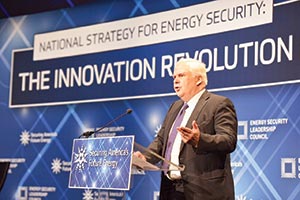FedEx Founder Smith Predicts Twin 33s Will Ultimately Win Federal Approval

This story appears in the May 23 print edition of Transport Topics.
WASHINGTON — Fred Smith, founder and chairman of FedEx Corp., said he believes nationwide use of 33-foot twin trailers can gain approval during the next presidential administration.
“We don’t think there is any chance 33-foot trailers will be approved until there is a new administration, but we think it will eventually because they are safer, more environmentally friendly and they save tremendous amounts of fuel,” Smith said.
Smith made the comments during a media roundtable here May 19 — which coincided with Infrastructure Week events — just before the release of an updated report from the Securing America’s Future Energy group, of which he is co-chairman.
The 170-page document outlined a series of environmental and technological steps the United States should take to further reduce its dependence on oil. Gaining approval of twin 33s was one goal stated in the heavy-truck section of the report.
For a portion of 2015, it appeared twin 33s would gain federal approval. However, the provision ultimately was left out of the final version of a large fiscal 2016 spending bill.
“We think this was a huge missed opportunity and, as in most things in Washington, it is very easy to stop something and very hard to get something done,” Smith said.
Explaining his position during the media briefing, he said the entire parcel delivery and less-than-truckload sectors, “without exception,” wanted to move to 33-footers and that FedEx already runs them in Florida and a few other areas.
“Adoption of the 33-foot standard would have saved 130 million gallons of diesel fuel a year, reduced emissions by thousands of tons of carbon every year and reduced the number of accidents on the road by a tremendous amount,” Smith said.
He added that they are “more stable” than the 28-footers. “The drivers like them better because they don’t drift in the wind when they are empty.”
Smith also had harsh criticism for advocacy groups that lobbied against them.
“The ‘safety advocates,’ not one of whom operates a truck or knows what it is like to get that call at 5 a.m. when there has been an accident, somehow felt 33-footers were ‘unsafe,’ ” he said.
Smith made his comments just days after FedEx Freight CEO Michael Ducker participated in a May 16 kickoff event for Infrastructure Week and called on Congress to authorize the use of twin 33-foot trailers as a “creative solution” to help the nation’s declining condition of roads and bridges.
“I imagine most of you would agree with me when I say that the transportation infrastructure in our country is at a really critical inflection point,” Ducker told transportation stakeholders, including corporate executives and government officials at the U.S. Chamber of Commerce. “The fact of the matter is that the deterioration of our nation’s highways, bridges and ports, both air and ocean, is reaching crisis proportions.”
Ducker said that for companies such as FedEx Freight, impassable roads and bridges lead to “increased cost, service delays and untold equipment damage.”
As a result, transportation stakeholders need to continue pressing for such sustainable funding as user fees, public-private partnerships and global private capital, he said.
“In conjunction with raising awareness of these funding opportunities, we also need to look at other creative solutions in the meantime that would significantly reduce wear and tear on our infrastructure,” Ducker said. “One solution that FedEx, in concert with other less-than-truckload companies, has strongly supported is the adoption of a new national standard of 33-foot twin trailers, which would reduce highway congestion and cut back on roadway wear and tear — all without changing the federal gross vehicle weight limit.”
Ducker said FedEx has operated twin 33s in Florida for 1.3 million miles. FedEx ranks No. 2 on the Transport Topics Top 100 list of U.S. and Canadian for-hire carriers.
Also at the Chamber event, CEO Thomas Donohue advocated for raising the federal fuel tax.
He told attendees that they need to convince the public that government officials can be trusted to make prudent infrastructure improvements by increasing the federal fuel tax, which has remained at current levels since 1993.
Federal fuel taxes amount to 24.4 cents per gallon for diesel and 18.4 cents a gallon for gasoline, and that income supports the government’s Highway Trust Fund that is used, in part, to pay for road construction and other surface transportation projects.
“We know everybody’s mad at Washington,” Donohue said. “They talk about pork and all of that. We have to convince them this is different.”

